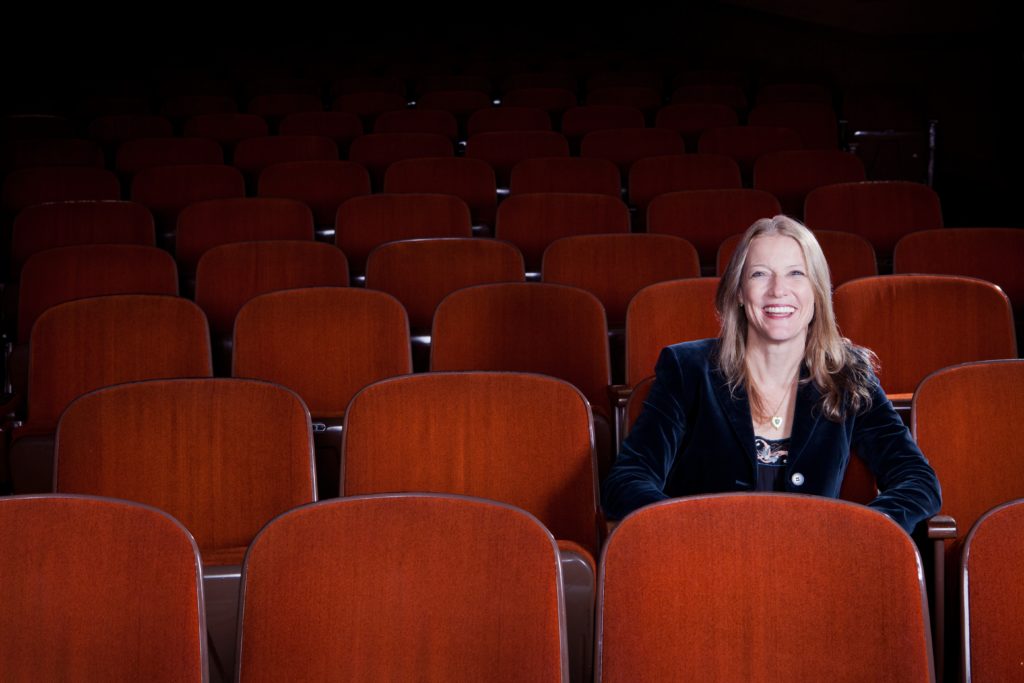On the cusp of the upcoming 25th anniversary of the Austin Film Festival, Barbara Morgan reflects on the ever-changing film industry and the impact the Austin Film Festival has had on the local community.
By Emily Benson, Photo by Shannon McIntyre
Barbara Morgan, co-founder of the Austin Film Festival, has always been avid about the motion picture. The quick-witted, pensive Pennsylvania native moved to Austin to attend the University of Texas and made the city her home. Under the expert guidance of her movie-loving mother, Morgan spent her childhood falling in love with old films and developing into the cinema connoisseur we know today. Since the passing of her mother, Morgan often remembers conversations the two had, allowing those heart-to-hearts to guide her on her unconventional path.
In the past 20 years, Morgan has revolutionized the landscape of film festivals by creating an inclusive event that puts writers and content creators in the spotlight. The Austin Film Festival now draws more than 10,000 screenplay submissions each year and cultivates dialogue about less prestigious roles in the movie industry. Morgan sat down with Austin Womanto talk about the festival’s 25th anniversary.
Austin Woman: What influenced your love of film?
Barbara Morgan: When I was in high school in the mid-’70s, the VCR came out. All the sudden, movie stores were on every corner. I would walk to school and in between school and our house was a video store. My mom knew movies and had a broad taste. Every day when I would leave for class, my mom would say, ‘Oh! See if you can find this movie at the video store.’ So, I would go pick up movies from the video store and my mom and I would watch them. She was encyclopedic about movies. By the time I was out of high school, I had seen a film school’s worth of old movies and discussed them with my mom.
AW: What sets the Austin Film Festival apart?
BM: Before starting the film festival, I had never been to a film festival. We didn’t know what to do. We just made it up. [Laughs] We called people but they wouldn’t tell us. We found the film-festival people were part of a club. There was no other festival doing anything for the writer; the writers were never important. I can’t tell you how many writers who were nominated or won Academy Awards during the first couple of years…told us they were not even invited to the premiere of the movie they had written. We took [producer Fred Miller’s]advice and didn’t have any VIP places, which is nontraditional for a film festival. Unlike most film festivals, it was communal. No one thought about or even asked about a VIP room. Nobody asked to be taken away from the audience. They were so happy to have people ask them about the movies they made when they had never been introduced to their own audiences before. It was really beautiful. They started sharing with each other as writers and as audience members. Cannes is a big celebrity fest. Toronto is a market. Sundance is about independent film. We were about the writer.
AW: What impact do you think the festival has had on Austin?
BM: When I moved [to Austin]in 1979, this was one of the most artistic communities that I had ever lived in—and I lived in a lot of places growing up! That’s what I loved about [Austin]. It was a magnet for me. [There weren’t] just intelligent people, but really broad-thinking, interesting people who had done things that I had never done before. I wanted to stay here because of them, and so did everybody else. Now [creatives]have been diluted by the people who have moved here because of them. Affordability affects everyone and creatives are not people on the high end of the earning market.
AW: What is the biggest challenge as a co-founder of the Austin Film Festival?
BM: Distribution. So many people are making movies that are never seen. We have to turn down films we would like to show, which is heartbreaking. In the first year, we started writing handwritten notes to our entrants. We had rejection letters, but on the scripts we read, we’d handwrite a note that said, “Really loved your script. Sorry you didn’t make it. Keep going!” Nobody does that. We were literally writing thousands of notes for films that we liked but couldn’t make the cut. As a filmmaker, you aren’t encouraged in a lot of places and nobody gets to see your movie because there’s no distribution. We want them to know that we liked it and to keep going.
AW: You’ve helped orchestrate this festival for more than two decades. What memory stands out to you the most?
BM: My mom passed away. It was a long time ago but…she meant a lot to me. I often think about how she would love our TV show because she loved film, the dialogue and the industry. I think she was a creative who didn’t have an opportunity as a housewife to pursue that [profession]. She would love to hear people talk about how they did it. I think about my mom and how the show is something that we put out there so people can enjoy it who don’t want to be writers. We have people coming who don’t want to be filmmakers. They don’t want to be creators. I love doing panels and hearing from people about why they made the choices they made. This ideology of creativity being shared helps people think creatively in other ways. I always leave the festival every year with a million new ideas.



